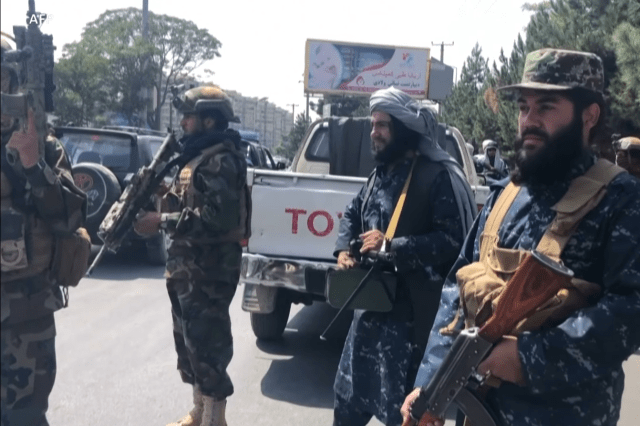
Author: Riccardo Valle
Recently, a video published by Al-Azaim Foundation, Islamic State Khurasan Province (ISKP)’s mouthpiece in the region, harshly lashed out against the Taliban and their relations with the international community and particularly neighbouring countries including Pakistan, China, and Russia.
In the video, the Taliban are described as Pakistani proxies serving ISI and CIA interests in the region, showing clips of Pakistan’s FM Shah Mahmood Qureishi’s trip to Afghanistan in October 2021 and the warm welcome he received by Afghan FM Amir Khar Muttaqi.
The video also features the October 2021 meeting between Taliban’s FM Amir Khan Muttaqi and Chinese FM Wang Yi. The footage displays pictures of Chinese soldiers pointing guns towards Uyghur civilians, while the speaker addresses China explicitly as responsible for killing Muslims.
Taliban’s relations with Russia are also targeted. The video includes Russia among those countries that committed atrocities against Muslims in the Muslim world – particularly in Syria – and shows Russian FM Sergey Lavrov and Taliban Deputy FM Mohammad Abbas Stanekzai standing side by side.
This is part of a broader propaganda campaign developed by ISKP, which aims at delegitimising the Taliban as a jihadist movement. Thus, the more the Taliban negotiate with the international community and make concessions to accommodate sections of the Afghan society and gain legitimacy, the more ISKP will be able to exploit these concessions to boost its propaganda and potentially attract new recruits for its operations.
Why does it matter?
ISKP has been one of the most successful provinces of the Islamic State, and the success of the group is reflected in its huge body of literature and propaganda, proving how the media warfare component is an important part of its overall politico-military strategy.
Recently, Chinese FM Wang Yi travelled to Kabul while at the same time, Russian special envoy for Afghanistan Zamir Kabulov also made an unexpected visit to the country. As ISKP closely monitors the Taliban’s actions, the group may target Chinese or Russian interests in Afghanistan or Pakistan if Kabul-Moscow-Beijing relations will actually materialise in more concrete actions.
While ISKP is focused on attacks inside Afghanistan and Pakistan, hitting different targets, both civilians and military, it has already produced in the past impressive propaganda which framed Pakistan, Russia, and China as three of the main enemies of Islam together with the US, Iran, and Saudi Arabia. Some of the most recent media products depict Russia and Iran as the main artificers of the war against the Islamic State in Syria and Afghanistan. At the same time, China is accused of killing innocent Muslims with the help of the Taliban, as the Islamic State’s Amaq News Agency stated on the occasion of the suicide attack carried out in Kunduz by ISKP militant Muhammad al-Uyghuri.



